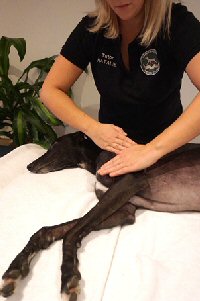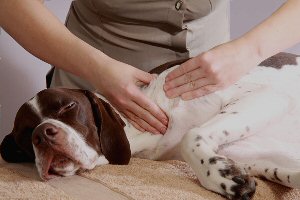Sparsholt and Winchester Universities to trial canine massage...
 Dog
owners may seek out massage therapy for their dogs for a variety of reasons
which may include chronic pain management, conditions such as arthritis, or to
improve common movement and mobility issues, e.g., lameness, slowing down, and
stiffness. Just as with humans, dogs have a complex anatomy and physiology and
may have a range of musculo-skeletal issues that only a highly skilled
practitioner can locate and treat. With off-the-shelf online courses readily
available and nothing to stop anyone calling themselves a canine massage
therapist, what education should dog owners look for to ensure that their
precious pet is in good hands? Virginia Harry reports. Dog
owners may seek out massage therapy for their dogs for a variety of reasons
which may include chronic pain management, conditions such as arthritis, or to
improve common movement and mobility issues, e.g., lameness, slowing down, and
stiffness. Just as with humans, dogs have a complex anatomy and physiology and
may have a range of musculo-skeletal issues that only a highly skilled
practitioner can locate and treat. With off-the-shelf online courses readily
available and nothing to stop anyone calling themselves a canine massage
therapist, what education should dog owners look for to ensure that their
precious pet is in good hands? Virginia Harry reports.
The Canine Massage Guild
will be making history when both Sparsholt and Winchester universities conduct
the first ever, in-depth clinical trials on the efficacy of clinical canine
massage therapy and, specifically, the Lenton Method®,
a three-tiered, results-driven approach to the assessment and treatment of
musculoskeletal problems in dogs.
The Lenton Method® uses
a systematic and scientific method of advanced palpation skills to isolate the
muscles and fascia for assessment. It also incorporates BodyMapping, an
anatomical site map with specific locations of injuries and issues, and 'the 7
Protocols,' a unique set of direct myofascial release techniques that
rehabilitate musculoskeletal injuries and provide chronic pain management for
orthopaedic conditions such as arthritis and hip dysplasia. Prior to its
application, Guild therapists prepare the tissue by using a selection of other
techniques from the four disciplines of Swedish, sports, deep tissue and
myofascial release massage.
Founder of the
Canine Massage Guild and Canine Therapy Centre, and creator of the Lenton
Method, Natalie Lenton comments, 'Our goal is for all owners to have access
to affordable, effective and ethical clinical canine massage for their dogs,
whether they are older and showing signs of ageing, recovering from lameness
caused by a muscular injury, or other changes in their activities of daily
living.
Having the Lenton
Method selected by these prestigious universities for in-depth clinical
trials will give us a scientifically-proven approach that owners can trust
and which, we hope, will also raise the bar for the profession as a whole.
This ground-breaking study is set to revolutionise the way we think about
clinical canine massage therapy for dogs.'
 Canine
Massage Guild therapists have undertaken a rigourous two year Clinical Canine
Massage Practitioner Programme, delivered by the Canine Massage Therapy Centre
and externally accredited with LANTRA, a nationally-recognised awarding body
regulated by OFQUAL, SQA and Qualification Wales. Canine
Massage Guild therapists have undertaken a rigourous two year Clinical Canine
Massage Practitioner Programme, delivered by the Canine Massage Therapy Centre
and externally accredited with LANTRA, a nationally-recognised awarding body
regulated by OFQUAL, SQA and Qualification Wales.
University Centre
Sparsholt is one of the UK's leading providers of undergraduate courses for the
land and environment. It has strong links with The Royal College of Veterinary
Surgeons as well as a large number of RCVS Approved Training Veterinary
Practices in the south of England. Winchester University’s Centre for Animal
Welfare is an interdisciplinary centre that undertakes research, teaching and
public engagement in the field of animal welfare. In the most recent Research
Excellence Framework (REF 2014) 82 percent of its submitted research was
considered to be recognised internationally, with seven out of eight units of
assessment achieving world-leading quality.
Study
– Predictors of Canine Massage Efficacy
A wide sample of
historical and contemporaneous data including consultation forms, submitted vet
reports and owner feedback will be collated from across multiple Canine Massage
Guild practitioners throughout the United Kingdom. This will include data from
every Kennel Club group classification and mixed breeds, from every age of dog
and role including pets, working dogs and sporting dogs, and with known
disabilities.
University Centre
Sparsholt will build a substantial database on which sophisticated statistical
analyses can be run to determine if there are statistically significant
predictors of successful treatment.
Study
2 – Double-Blind Trials
In 2019, following
veterinary referral, double-blind trials will be conducted for a sample study of
dogs of similar age, breed and presenting condition. An agreed set of evaluation
tools and patient reported outcome measures will be used to measure the health
gain in dogs following the application of The Lenton Method®.
The trials will
incorporate owner pre- and post- treatment observations based on the five
pillars of muscular pain - subclinical signs of muscular and myofascial injury
for both acute and chronic pain:-
Participating dogs will
be randomly assigned to two groups, a treatment group and a non-treatment group.
Owners will be invited to attend for a course of three weekly appointments.
However, only the participating therapist and assigned Research Assistant from
University of Winchester will know which dog has received treatment
The data
gathered will inform on the impact of the condition
pre-treatment and the impact after the application of the Lenton Method® on the
dog’s daily life.
 About
the Canine Massage Guild About
the Canine Massage Guild
Clinical Canine Massage therapy as practised by members of the Canine
Massage Guild typically sees results in 1-3 sessions based on an ethical client
approach model and the unique integrative blend of four disciplines of massage
alongside the unique Lenton Method®.
For chronic
pain management, soft tissue injury rehabilitation, and orthopaedic and
neurological condition support, clinical canine massage blends myofascial
release (MFR), both the direct and indirect approach, sports massage, deep
tissue massage and Swedish massage. It also incorporates the trademarked MFR
protocols from the Lenton Method®, a three-pronged approach that incorporates
advanced palpation skills, BodyMapping (an actual map of the body that is used
to determine common areas of muscular injury and issue as well as myofascial
pain developed over the course of 10 years) and The 7 Protocols, a unique
set of MFR techniques that produce long lasting results.
Clinical
therapists are also trained in the assessment of orthopaedic and neurological
conditions essential for patient referral back to their consenting vet to ensure
paramount client care. Written reports are also provided to the consenting vet
and sensible home care plans are provided to the owner.
The initial
Clinical Canine Massage Practitioner Programme is delivered by the Canine
Massage Therapy Centre Ltd. over a period of two years and it is externally
accredited by LANTRA. Upon completion and pass of written and practical
examinations, therapists are able to join the Canine Massage Guild and commit to
Continuing Professional Development (25 hour/year minimum) provided exclusively
by CMTC for Guild members including manual lymphatic drainage, facilitated
stretching, skill reviews, neuromuscular refacilitation, ventral MFR and other
clinically appropriate bodywork courses.
Animal welfare, consumer
protection, clarity of law and professional standards are the Guild's core
values alongside providing the best service possible to dogs, their owners and
vets. The online therapist register includes members from the UK, Ireland and
Spain.
For more information,
visit the Canine Massage Guild web
site or email:
info@k9-massage.co.uk
First Published 23rd
September 2018
|